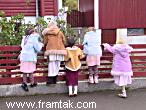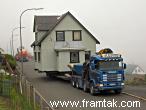 |
Everyday life in the Faroes |  | HOME |  |  |
Questions to framtak.com
This section began as a result of a message from David Haldane in the UK. David wrote that he would like to see more about everyday life in the Faroes. He had made an informal survey while at a party to find out what, if anything, the other guests knew about the Faroes.
The following are some of the questions he was asked. They are followed by questions from others who have written to framtak.com. Obviously we can't cover everything, and others might respond differently, but hopefully our answers will give a small glimpse of some aspects of daily life here.
"How do they tolerate the cold and damp?"
"What do they do for entertainment?"
"How do they make a living? They can't all be fishermen"
"How do doctors reach their patients on isolated islands in bad weather?"
"How do people cope? How does a housewife stay sane when her husband is out at work all day? What does she do?"
"How do children get to school?"
"Is there much crime?"
"Do they have a drugs problem?"
"Where do the islanders come from originally?"
"Have they found any oil up there?"
"What about the infrastructure, what sort of communications facilities?"
A question from Lawrence Edmonds in the UK:
"What is Faroese television like?"
A question from Susan See in the USA:
"How is health care carried out in the Faroes? I work as a nurse, so I wonder what happens when there is a medical emergency. I live in a community of about
130,000; it's a bit hard to imagine a nation of 45,000."
Click here to send further questions
Q: "How do they tolerate the cold and damp?"
A: This question was probably more pertinent in past centuries, these days people live in modern comfortable homes and have a high standard of living similar to other Nordic/Scandinavian countries. It is true that the average summer temperature of 11C (52F) is not hot and it's considered a heat wave if it reaches 20C (68F) but on the other hand it doesn't get really cold in the winter, the average is 3C (37F). The temperature seldom falls below freezing because of the gulf stream drift. It can seem colder though if its wet and stormy and yes, it can be damp here as is to be expected for islands in the North Atlantic. Perhaps we tolerate the sometimes unpleasant weather because the other advantages of living here outweigh that inconvenience.
Back to the top of the page 
Q: "What do they do for entertainment?"
A: Similar entertainment is available here, in one form or another, as is found in the rest of Europe. You can go to the cinema, a dance, a concert or sometimes the theatre but such things are not of course on the same scale as in London, Paris or New York :) and for some things its necessary to visit the capital, Tórshavn. Various sports are popular - especially football. There are a number of notable festivals. There are evening classes in the winter months with all kinds of activities and a lot of people enjoy an evening out at these. For women, there are also knitting clubs and these offer far more than what you might imagine by the name. They usually involve good food and a fun evening and sometimes outings together. You can also stay home and watch the television, both satellite and local. Religious life too provides numerous social activities. Your view of what is available will no doubt be influenced by what you are used to where you live. If, for example, you come from a place where there are many pubs and clubs you would find them in short supply here. If you are wondering what might be different here it should be mentioned that a large part of the social life revolves around people visiting each other in their homes. There are always neighbours, friends and family celebrating something or just enjoying each others company. And, if you want to really feel the pulse of the culture there is Faroese dancing See a puffin cartoon version.
Back to the top of the page 
Q: "How do they make a living? They can't all be fishermen"
A: Fishing is the major industry but in today's world of technological wonders the ships only require small crews so everyone is not a fisherman. There are many fishing related jobs though - fish factories, fish auctions and companies selling fish on the international market. That is not to say that a large number of people don't fish - many have their own small boats which they use to go fishing in and these very distinctive Viking styled craft can often be seen in the fjords and round the islands. The people you see rowing across the fjord might work in the local bank, be school teachers, shop keepers, computer programmers, hotel workers, politicians or any one of all the other occupations that are found in towns and villages. They are probably the same people you see looking after a few sheep or painting their house, installing a new satellite dish, singing in a choir or playing in a rock group. They might well use a laptop computer to keep track of their sheep breeding. Among them will be painters, writers and poets. Some make a living in the small shipyards and a number are working in the oil industry which is as yet still at the stage of exploration and preparation here. The women are not so likely to be out on the sea, although there are some there, or climbing over the mountains after the sheep but they can be found in most other areas and they probably make up the largest number in the service related jobs. So, you are right, Faroes people are not all fishermen, even though the major part of the country's income comes from fishing, it is not the main employment.
Back to the top of the page 
Q: "How do doctors reach their patients on isolated islands in bad weather?"
A: Most islands are connected by regular car ferry or ordinary ferry services and the weather has to be very bad before they stop running. When there are emergencies the doctors use helicopters.
Back to the top of the page 
Q: "How do people cope? How does a housewife stay sane when her husband is out at work all day? What does she do?"
A: How do housewives stay sane anywhere? The reality is that there are probably nearly as many women in the workforce as men so there are not masses of women abandoned in their homes. There are those at home with new babies and young children but this is not generally a cause of insanity :) Some of the nurseries have waiting list but there is usually a family member or friend to help out when necessary. Those at home are not locked in and have social interaction in the wider community, a community which is more like an extended family. Nowadays also, it's not unusual to find these same housewives "chatting" on the internet.
Back to the top of the page 
Q: "How do children get to school?"
A: For many it's a five minute walk as there are schools most places. They may go by car, bicycle or by school bus if they live further away. None of them have to go vast distances. When they reach high school and college age they may have further to go and for some it may include a ferry trip. Some of them stay in student accommodation or bed-sits near the schools.
Back to the top of the page 
Q: "Is there much crime?"
A: Compared with the larger countries the answer is no and serious crime is rare. There is some petty law breaking though some of which is the result of alcohol misuse.
Back to the top of the page 
Q: "Do they have a drugs problem?"
A: In recent years some drugs have reached the islands - mostly cannabis - and these days the customs officers use dogs. Thankfully, the use of drugs is still small. Everything is relative though and for most of us any use of illegal drugs is considered a problem.
Back to the top of the page 
Q: "Where do the islanders come from originally?"
 A: The first people that are known to have settled here were a few Irish monks around the seventh century. Little is known about them or what happened to them. A few years later, the Norwegian Vikings began to arrive and it is the Vikings who populated the islands and are the main forebears of today's Faroese.
A: The first people that are known to have settled here were a few Irish monks around the seventh century. Little is known about them or what happened to them. A few years later, the Norwegian Vikings began to arrive and it is the Vikings who populated the islands and are the main forebears of today's Faroese.
A small number of people have come from other lands.
Back to the top of the page 
Q: "Have they found any oil up there?"
A: Serious oil exploration has being going on for some time and there is every expectation of there being significant finds and exploitation in the next few years. There was some delay while the question of ownership was dealt with. Now it is clear that oil under the sea around the Faroes belongs to the Faroes and not Denmark and an agreement on the demarcation line has been agreed with the UK, work is progressing more rapidly See a puffin cartoon about this.
Back to the top of the page 
Q: "What about the infrastructure, what sort of communications facilities?"
A: The country is governed by its own parliament and has its own flag and language. It is part of the Kingdom of Denmark but unlike Denmark is not a member of the European Union. Currently it is moving towards full sovereignty. It is made up of many municipalities and the local councils generally take an active role in local affairs. It is a distinctly maritime nation and the main industry is fishing so the main system of organisation revolves around that either directly or indirectly. Recently, preparation for undersea oil exploitation has been added as part of the equation. There are harbours in practically every town and village and a number of fish factories throughout the land. There are good hospital and medical facilities although, as in some other areas, there have been cutbacks since the economic difficulties at the end of the eighties and difficulties with staying within the available budget. There is an extensive network of excellent roads and ferry services so it is possible to travel throughout the islands by bus car and boat. There is an international airport and freight and passenger services by sea. Other communication facilities are also good with modern telecommunication equipment being the norm even on the smaller islands. The possibilities offered by the internet have quickly been seized and are widely used. Faroes is linked to other lands with a transatlantic optic fibre cable. There is also the Faroese radio service, television service and wide use of satellite television.
Back to the top of the page 
Q: "What is Faroese television like?"
A: Sjónvarp Føroya (SvF), the Faroese national television company, is the only station broadcasting in Faroese. It is the Faroese equivalent of the BBC and transmits news, documentaries, entertainment, culture, sport, drama and, not least, children's programmes. SvF is an independent organisation and finances itself by licence fees, advertising and bingo. It produces some of the programmes itself and translates others into Faroese. It began broadcasting in 1984 and is on the air about 40 hours a week. Although many people here have access to satellite television from the larger countries, the majority of the population views SvF. Doubtless SvF would like to make more and better Faroese programmes but those it makes are friendly and profesional. Considering the nation is made up of only 45 thousand people and Svf has limited resources, it does a remarkable job.
Back to the top of the page 
Q: "How is health care carried out in the Faroes? I work as a nurse, so I wonder what happens when there is a medical emergency. I live in a community of about 130,000; it's a bit hard to imagine a nation of 45,000."
A: There are 3 hospitals, one on an island in the north, one on an island in the south and the main hospital between them in the capital on the largest island. The islands are connected by ferries and undersea tunnels. If time and conditions don't allow ambulances to serve the need, then a helicopter is used.
Everyone pays a small health insurance fee and there is good health care for everyone. The hospitals have good facilities and, should there be an occasion when some particular specialist care is needed that is not available here, the patient is flown to a neighbouring country as there are agreements in place to cover this. We are though a bit short of doctors, so the ones working here are a bit stretched.
Back to the top of the page 
|
The photos at the top of the page are: 1. A dogs life 2. Children in Fuglafjørd 3. Moving house ... |
 Copyright Copyright © 1997 - 2010 Framtak, FO-650 Toftir, Faroe Islands |
|
|

|



